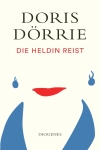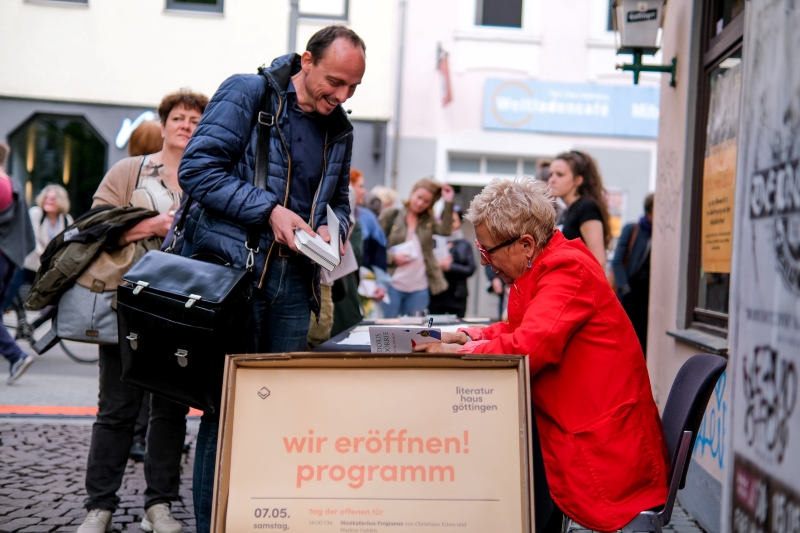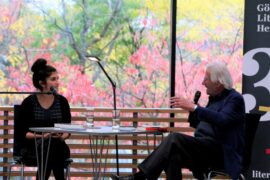Doris Dörrie’s live reading of her travel memoir Die Heldin reist on the opening day of the Literaturhaus in Göttingen wittingly takes the audience on an adventure with her worldly travelling experiences. She motivates them to fearlessly tackle language and cultural barriers while travelling.
By Tripti Sharma
Pictures: Dietrich Kühne
Live reading performances are a remarkable experience: novels gain liveliness with the original voice of the author. The imagery in the book becomes a new meaning when the author’s experiences are shared with the proximity of the readers. The first reading of the Literaturhausopening on this sunny summer day shows the excitement for live cultural events after two years of pandemic. On this afternoon, the crowd is going crazy about Doris Dörrie’s reading of Die Heldin reist. People are queuing outside the Literaturhausin Nikolaistraße 22 proudly flaunting tickets in their hand. They are eager to occupy a seat with the best view of the author in order not to miss any sight of her, remarking their excitement for the event. Guests are rushing in the new literature house with their hardcopies to get an autograph from the author. A feeling of engagement and togetherness is palpable in the air.
Lifting the Veil

Doris Dörrie
Die Heldin reist
Diogenes: Zürich 2022
240 Seiten, 22,00€
Shortly after the author begins reading, the room is filled with laughter and applause. Dörrie’s memoir is inspired by her solo travel experiences. It encourages its readers, especially women, to transgress the shackles of the society. Her narration is inspiring and implicitly motivates them to dare to face the challenges of travelling alone. Throughout her memoir, she provokes women to explore the world and inspires them to grow. This will, in Dörrie’s opinion, ultimately turn out to be a gateway for discovering a heroic part of them at the end of their travel.
All this can be inferred from the references she gives in the initial pages of her book by comparing »der Held« and »die Heldin«. In her opinion, »der Held« rises in his life early as compared to »die Heldin« because »die Heldin« stays in a small cubicle all her life and finds her happiness by associating success with »der Held« and children. Dörrie emphasizes the fact that »die Heldin« is always taught to be a typically good wife or daughter. Through this example, she tries to break the preconceived notions of society and promotes emancipation among her female readers. Gradually, she introduces the audience to the malevolent perspective of society towards women. The book whimsically expresses the difficulties people face in accepting the fact that a woman is capable of doing more than household chores. She acquaints this idea to the readers subtly through humour. During the performance, she adds comments to her reading, stating: »Every move was liberating for me«. Her writing draws parallels and contradictions by comparing host land and home country with lively imagery.

Dörrie reflects on her journey to three different countries and continents: USA, Japan and Morocco. Her memoir entails not only humorous incidents during her days in the United States but also a gratifying time of self-discovery in Japan. She claims: »I never failed to find a better version of myself in a foreign country and I will keep dreaming about it«. Her travel memoir whirls around the adventures she undertook during her stay in the USA. She describes the warnings she got as a woman to not step out alone after sunset. She shares her days of struggle while immigrating to the USA as a student and hiding her real identity to get accepted. Nevertheless, she accepts the challenges falling on her way, which could not stop her from achieving her desires. Thus, she goes around the world dauntlessly. She delineates the challenges ranging from confronting cultural shocks on her first visit to the US and Japan while going around the countries with a pint-size knowledge of the respective languages.
The Difficulties of Travelling
She moves on to talking about her abundant travel experiences in Tokyo. She familiarizes the listeners in the room with the dogmatic perspective of men in Tokyo who dislike the idea of her being the »boss« of her own life. These observations of Doris Dörrie’s enrich her memoir and push her to transgress the boundaries of the patriarchal social norms. She then reminisces about her travel to Morocco with her best friend Eva (name changed) who is efficiently disciplined and organized unlike the author. To travel with her friend means no day without a fight due to their different experience level with travelling. For herself, it is an integral part of her life. Constantly, she emphasises travelling as a therapy to learn, grow, and wander. She suggests that, to become a hero, or rather: a heroine, one has to step out of one’s comfort zone and take over the adventure as the world is open to discovery. She encourages women to spend their time outside the four walls of their house to step on the same pedestal as that of a »Held«.
All in all, the reading of Doris Dörrie’s travel memoir is a tour de force. Throughout, her writing is full of curiosity for the unexplored. It introduces the audience to the challenges of travelling alone and with friends as well as to her blissful journey of self-discovery in every expedition she undertook which lead her to happy endings. Dörrie ends her reading by announcing upcoming projects, such as Freibad, a movie set to premiere in September. It seems more adventures are ahead for the heroine.
Info
You can find more of our coverage of the Literaturhaus opening here.






